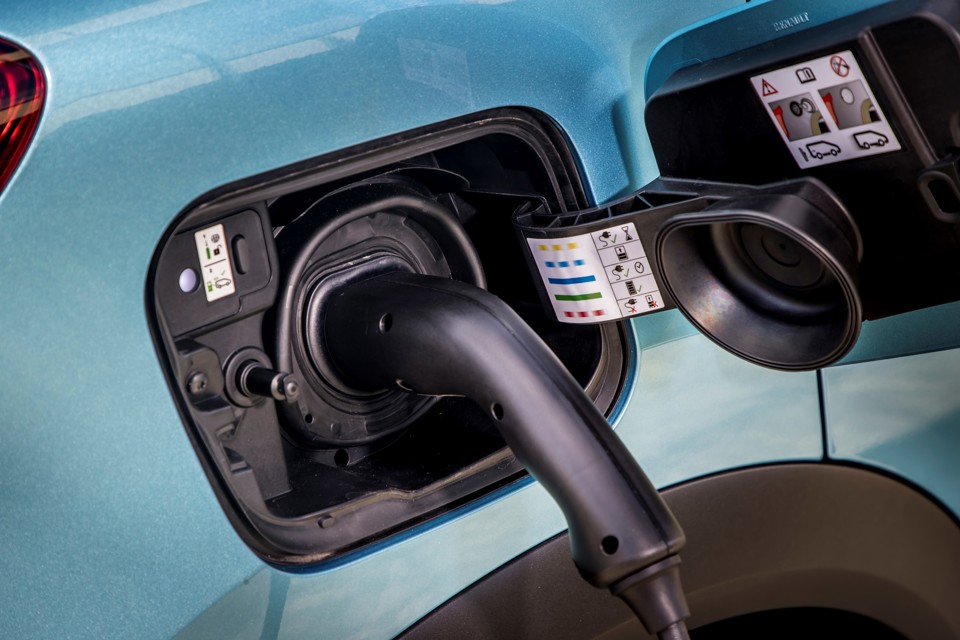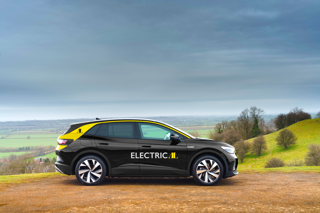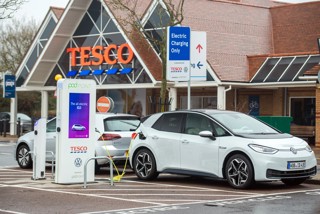Motorway service stations could be forced to end exclusive arrangements with charge point operators under new rules being considered by the Government.
Currently, the majority of motorway service areas in England have an exclusive provider of open access charge point services, which poses a potential risk when awarding cash from a new £950 million Rapid Charging Fund.
The fund aims to future-proof electrical capacity at motorway and major A road service areas to support the phase-out of petrol and diesel cars and vans.
(Go to: EV charging infrastructure questions answered at Fleet & Mobility Live)
Available in England-only as the provision of transport infrastructure is devolved, it will support the cost of providing additional or upgraded electrical connections at motorway and major A road service areas.
The fund will be administered by a delivery body which will: accept funding applications from motorway and major A road service areas; examine the applications to ensure the requested connection size is based on robust estimates of expected demand from a 100% zero emission vehicle fleet; and potentially act as the owner of the new/upgraded connection, leasing capacity to applicants.
However, with motorway service areas in England operating exclusive arrangements with charge point providers, ministers are concerned this could lead to any funding being challenged on state subsidy or other grounds.
The Competition and Markets Authority completed a study of the EV charging market in July 2021 and decided to open an investigation into these existing agreements at three of the major motorway service operators under the Competition Act 1998. It has yet to publish its findings.
In a zero-emission vehicle consultation, one of five on transport regulatory reform launched by the Department for Transport (DfT) yesterday (Tuesday, September 29), the Government says it is considering taking new powers to make the exclusive elements of existing charge point service arrangements void and unenforceable.
To ensure long-term competition is maintained at these sites, it says it is considering requiring service area operators and large fuel retailers to tender charge point service contracts openly and have a minimum of two – and at some sites more than two – different charge point operators at any particular site.
It says that the effect of this will be create more competition between charge point service providers at these sites for the benefit of consumers, and to reduce the legal risk to the fund.
It added: “We are considering requiring existing providers of charge point services at motorway service areas to make their charge points open access rather than only open to an exclusive network or group of networks or manufacturers.
“This would also extend to existing agreements for such services, which would be rendered void and unenforceable if the network were not to be opened.”
Furthermore, to ensure there is sufficient charge point availability at these strategically important sites on the network, it says it is considering further extending its powers to mandate that service area operators and large fuel retailers must meet minimum charge point numbers at specific sites, and at increasing levels over a period of time.
The Office of Zero Emission Vehicles (OZEV) in its consultation ‘Future of transport regulatory review: zero emission vehicles' is seeking views on new primary legislation that would give the Government powers to introduce requirements in four areas, including new powers to support the delivery of the Rapid Charging Fund.
The other three are examining the introduction of a statutory obligation for local authorities to plan for and provide charging infrastructure, requirements to install charge points in non-residential car parks and requirements to improve the experience for EV consumers.
Future of Transport consultations
With radical changes in transport expected over the next decade, the Government says it is making sure the right framework is in place to drive innovation, keep people safe and harness the benefits of new technologies right across the country.
Transport secretary Grant Shapps said: “This is a hugely exciting time for transport in the UK.
“On our roads EVs are set to become the norm within the decade, on our seas autonomous and remotely operated vessels will increase efficiency and improve safety, and in our skies drones and novel aircraft will transform the way people and goods move around.
“Supporting these innovations will not only ensure high standards for consumers but also create a research-friendly environment so we can continue being world leaders in transport.
“We will create a safer, greener transport system that attracts investment and supports skilled jobs across the country.”
Alongside zero emission vehicles, consultations have been launched into modernising vehicle standards, maritime autonomy and remote operations, the future of flight and regulatory sandboxes - a defined space where new business models, technologies and policies can be deployed and used in a way that is safe and responsible.
On vehicle standards, the consultation says the Government wants to implement improved environmental standards and enforcement to better meet current and future challenges, particularly around self-driving vehicles.
It is proposing four areas where it wants to make changes, with the consultation seeking views on: providing a modern framework for tomorrow’s vehicles – regulating safety, security and environmental performance; establishing a flexible, proportionate, and responsive approach to regulating safety, security and environmental performance of vehicles; tackling tampering; and improving compliance, safety and security.
EV charging infrastructure questions answered at Fleet & Mobility Live
Delegates to next week's Fleet & Mobility Live will gain access to a best practice masterclass that condenses 10 years of electric vehicle charging lessons into a 45-minute session.
Fraser Crichton, Dundee City Council corporate fleet manager and Gary Mcrae, former colleague of Crichton and head of electric mobility at Urban Foresight will share their journey with an in depth presentation that will help fleets with their current and future infrastructure and energy plans.
Delegates attending the event, which is free to attend for fleet decision-makers and takes place on October 5 and 6 at the NEC, near Birmingham, will gain access to 20 seminar sessions from over 25 expert speakers across three theatre areas: Operational Excellence, Strategy and Benefits Box.
Both Mcrae and Crichton have helped to establish Dundee as one of the most advanced cities in the world for EVs.
The “establishing a robust EV workplace charging infrastructure” session is just one presentation that will be at Fleet & Mobility Live, with over 18 expert seminar sessions and more than 20 speakers confirmed across both days.
The show will also offer expert views on emobility strategy development, making the business case for EVs, views on the Government’s latest decarbonisation plans and much more.
The full agenda for Fleet & Mobility Live is now available to view and registrations are open and free to fleet decision makers.
> Interested in comparing electric vehicle data? Check out our EV tool.
> Interested in ensuring the efficient use of EVs. Check out our dedicated editorial sections: Insight & policy | EV news | Charging & infrastructure | Costs & incentives | Benefit-in-kind | EV case studies | EV road tests
























Login to comment
Comments
No comments have been made yet.